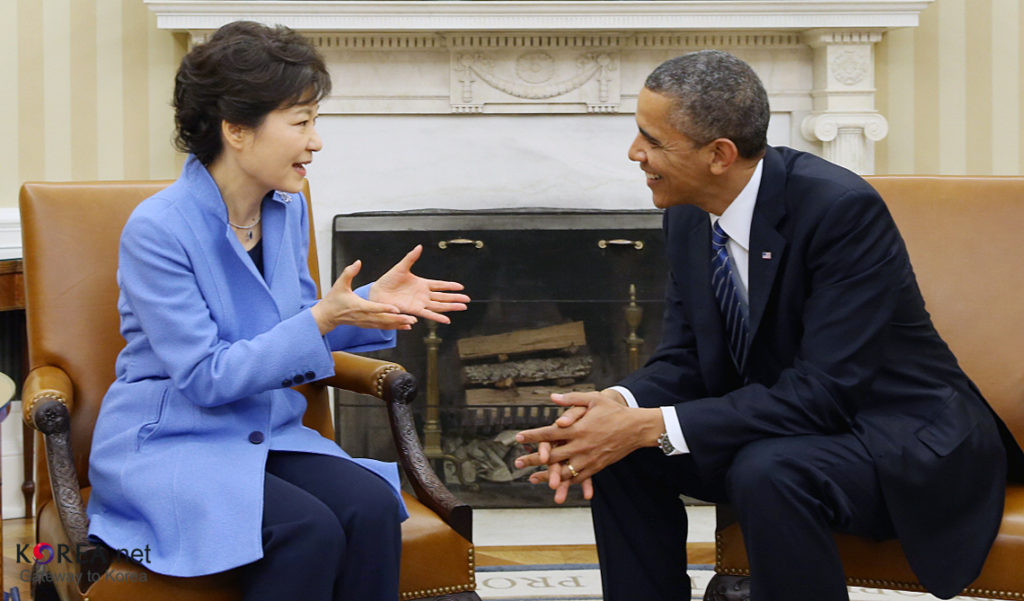The Peninsula
R & R Needed on President Obama’s Trip to Korea: Reassurance & Reaffirmation

By Nicholas Hamisevicz
Reassure, reaffirm, reengage, and rebalance are all going to be key words used during President Obama’s trip to Japan, South Korea, Malaysia, and the Philippines. This is a very important trip for President Obama. During this visit to Asia, President Obama has to try to make up for the cancellation of a trip to the region last fall because of the U.S. government shutdown, to continue to mend Korea-Japan ties, and reassure a nervous region that the rebalance is a real strategy with actions and commitments as opposed to just a political slogan.
However, concerns about how President Obama handled the red line of chemical weapons in Syria, Russia’s invasion of Crimea, further tensions in Ukraine, and what this means for U.S. deterrence are percolating in the region. In South Korea, in addition to all these issues, there is an anxiety about Japan’s more muscular and vigorous reemergence. Thus, for the Korea leg of the trip, reaffirming the alliance and reassuring South Korea will be at the top of the agenda for President Obama.
Part of the reassuring process with Korea will not be easy. President Obama needs to be frank with South Korean President Park Geun-hye about the United States’ longstanding desire for Japan to contribute more to security in the region and globally. The U.S. has encouraged Japan for a long time to allow for greater flexibility and maneuverability with Japan’s military forces, particularly to assist in the defense of U.S. forces and its homeland from possible attack.
With South Korea being the second leg of the Asia trip, President Obama can privately reassure Park Geun-hye that the U.S. has only encouraged Japan to undergo military modernization to enhance regional security and has stressed to the Abe administration to refrain from making unhelpful statements and actions that antagonize South Korea (and China). Publicly, he should emphasize the importance of strong bilateral alliances with South Korea and Japan. Furthermore, President Obama should stress the necessity for trilateral cooperation between the U.S., South Korea, and Japan in helping to secure peace and prosperity in the region.
President Obama must also be strong in reaffirming the importance of the U.S.-South Korea alliance. His stay in Korea is short, and the announced schedule doesn’t have that many opportunities for President Obama to publicly discuss the bilateral relationship. While there are some important issues for the U.S. and Korea to discuss, President Obama should look to describe how Korea specifically is part of his rebalance to Asia. South Korea is a dynamic and vibrant country that shares many of the same overall values and goals for the region as the United States, making it an intrinsically important friend for the U.S.
Speeches and private reassurances of the U.S.’s commitment to Asia from President Obama can be helpful and will be needed during this trip to Asia. While in the medium term actions will be required to restore some confidence in the U.S., this trip is a needed first step. Reassurance and reaffirmation, while difficult, should be a major focus for President Obama in South Korea. He must explain the U.S.’s need for Japan to contribute more to regional security. This will help give the U.S. the opportunity for better Korea-Japan relations, bilateral relations with South Korea and Japan respectively, and trilateral cooperation that offer the prospect of a peaceful and prosperous Asian century.
Nicholas Hamisevicz is the Director of Research and Academic Affairs for the Korea Economic Institute of America.
The views expressed here are his own. Photo from Nadir Hashimi’s photo stream on flickr Creative Commons.
